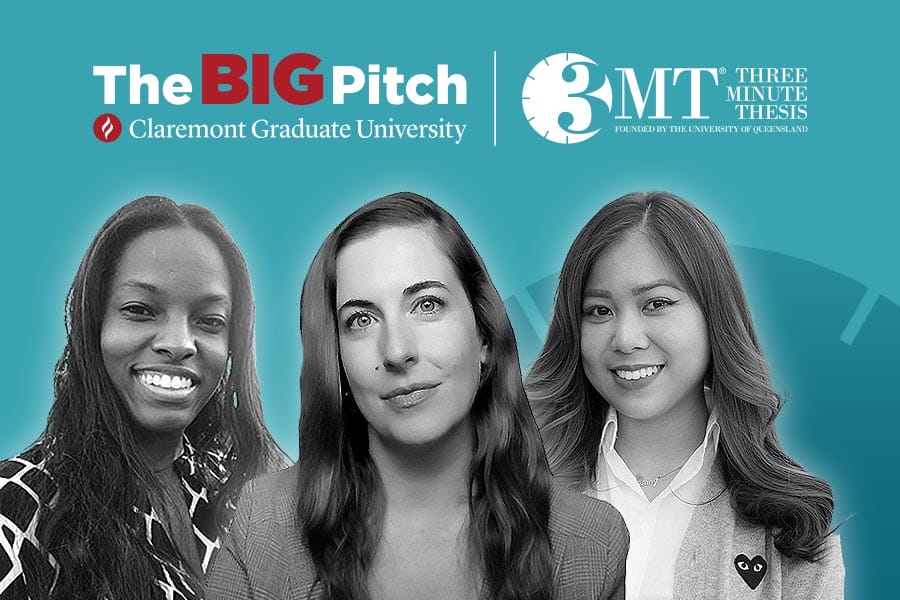Time Is of the Essence at CGU’s Big Pitch Competition

Things you can do in three minutes:
- Brush your teeth
- Walk two blocks
- Make your bed
- Explain your data-driven graduate research project to a general audience
Six doctoral students at Claremont Graduate University—finalists in the fourth annual Big Pitch competition on November 17—showed that the latter is not only possible but that it can even be engaging and entertaining.
“This was initially conceived as an academic equivalent to an elevator pitch,” said Marcus Weakley, director of the Center for Writing & Rhetoric at CGU and the facilitator for the event. “You’re practicing how to talk to someone who might not understand the significance of your work.”
The benefits can be far-reaching, especially when it comes to networking, developing self-confidence, or applying for that first faculty position.
“There might be one or two people on the hiring committee who are familiar with your area of expertise, but there definitely are going to be several who are not,” Weakley said. “Being able to share your expertise and its importance in an easy-to-understand way can be a difference-maker.”
More than 900 universities worldwide host a version of the event, which began in 2008 as the Three-Minute Thesis at the University of Queensland in Australia. The rules are simple but daunting: Competitors have a maximum of three minutes and a single PowerPoint slide for their online presentation. The judges rate them on content, audience comprehension, and how well the slide complements their presentation. Those who exceed the three-minute threshold are disqualified. (Two of the six CGU students barely went past the allotted time.)
Weakley said a key strategy is to avoid dumbing things down for the judges.
“You want to be able to tell a story and convey the significance of your work while appealing to their intellectual curiosity,” he said. “Because it’s a general audience, there’s a tendency to think, ‘OK, I’m just going to simplify everything that I’ve done.’”
Christine Keelin, who is pursuing a PhD in positive organizational psychology, avoided that pitfall and won the top prize of $1,000 for her presentation on “Energy Vampire Bosses vs. Empowering Leaders: Is Your Workplace Draining Your Energy?”
“There’s a misconception in how we tend to view leaders,” she said. “Charisma is often seen as a good leadership quality, but it can actually manifest as narcissistic behavior, and narcissists can harm the energy level in the workplace.”
For her PhD research, she conducted a survey in which participants responded to voicemails from two bosses, one a narcissist—an energy vampire—and one an empathetic, empowering leader. Keelin’s research confirmed that energy levels dropped significantly with the former but increased with the latter.
“The power of words can absolutely affect work culture and performance,” she said.
Keelin, who teaches business communications at Citrus College, says she hopes to apply her PhD experience in the classroom as well as in consulting. She also continues to work in her family’s food business.
“I think I’m going to be a true LA person who has multiple jobs to pay the rent,” she said jokingly.
The Big Pitch is open to all CGU master’s and doctoral students at any point in their studies. The other finalists were:
- Second place – Katrina Smith, history ($500 prize)
“The 5-KIN Project: African American Lineage and Migration Society”
- Third place – Giang Huynh, education ($250 prize)
“Elevating for Excellence: A Transformative Journey Through Evaluation and Institutional Research”
- Rebecca Donaldson, positive developmental psychology
“Hidden Needs: Mentoring Survivors of Trauma in Higher Education”
- Cristina Stanley, doctor of public health
“So You Are Telling Me, I Have to Die While Giving Birth to My Baby but It’s Preventable if You Would Just listen to Me, WHY?”
- Sneha Suresh, applied cognitive psychology
“Best-Practice Guidelines for Eyewitness Identifications: Appearance Change Instructions”